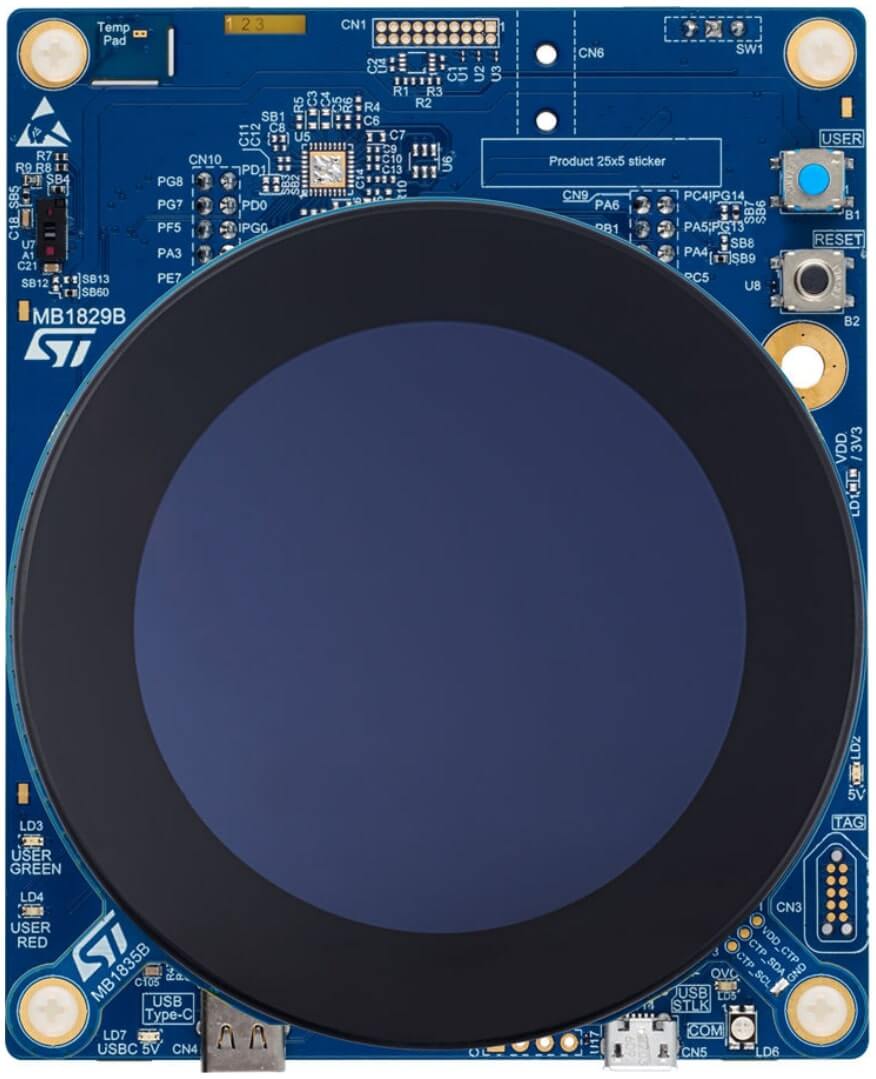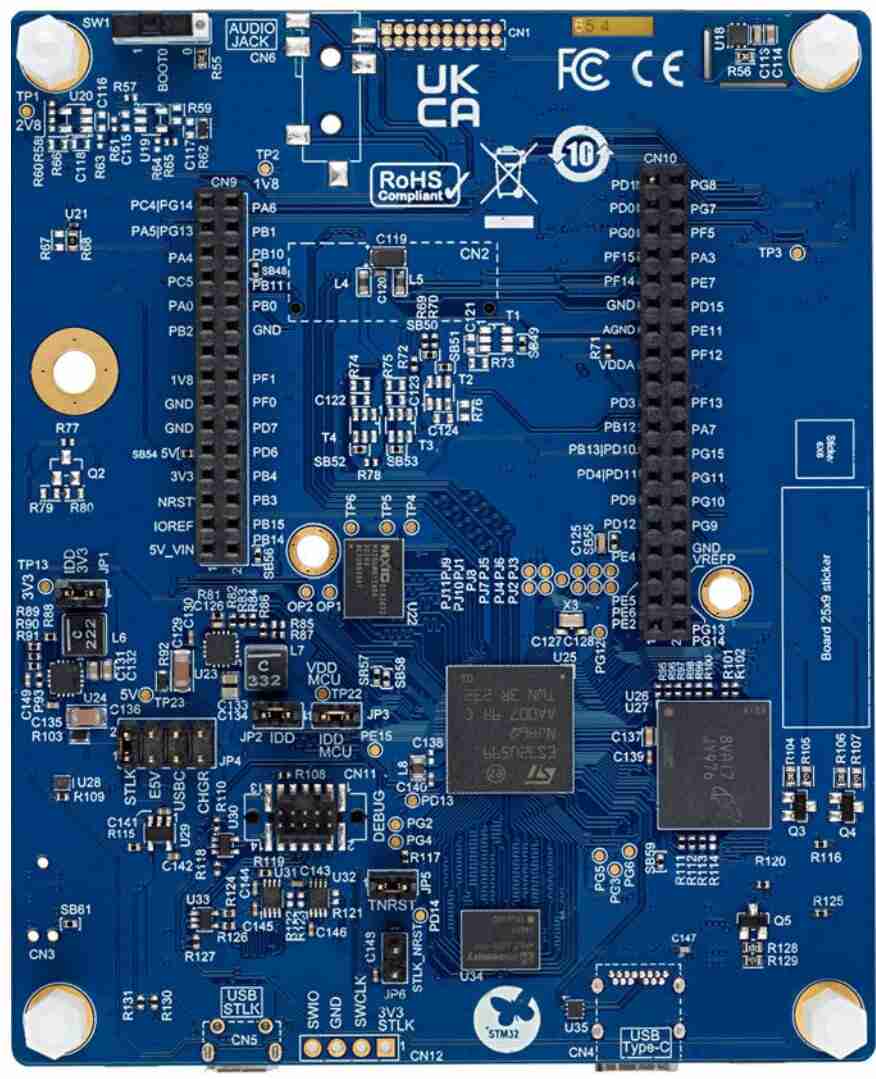STM32U5A9J Discovery Kit
Overview
The STM32U5A9J-DK Discovery kit is a complete demonstration and development platform for the STM32U5A9NJH6Q microcontroller, featuring an Arm® Cortex®-M33 core with Arm® TrustZone®.
Leveraging the innovative ultra-low-power oriented features, 2.5 Mbytes of embedded SRAM, 4 Mbytes of embedded flash memory, and rich graphics features, the STM32U5A9J-DK Discovery kit enables users to easily prototype applications with state-of-the-art energy efficiency, as well as providing stunning and optimized graphics rendering with the support of the 2.5D NeoChrom Accelerator, Chrom-ART Accelerator, and Chrom-GRC™ MMU.
The full range of hardware features available on the board helps users to enhance their application development by an evaluation of all the peripherals such as a 2.47-inch RGB 480x480 pixels TFT round LCD module with MIPI DSI® interface and capacitive touch panel, USB Type-C® HS, Octo-SPI flash memory device, Hexadeca-SPI PSRAM memory device, eMMC flash memory device, Time-of-Flight and gesture detection sensor, temperature sensor, and two 2.54 mm pitch double-row flexible expansion connectors for easy prototyping with daughterboards for specific applications (USART, LPUART, two SPIs, SAI, three I2C, SDMMC, ADCs, timers, and GPIOs).
The STM32U5A9J-DK Discovery kit integrates an STLINK-V3E embedded in-circuit debugger and programmer for the STM32 microcontroller with a USB Virtual COM port bridge and comes with the STM32CubeU5 MCU Package, which provides an STM32 comprehensive software HAL library as well as various software examples.


More information about the board can be found at the STM32U5A9J-DK website. More information about STM32U5A9NJH6Q can be found here:
Supported Features
The stm32u5a9j_dk board supports the hardware features listed below.
- on-chip / on-board
- Feature integrated in the SoC / present on the board.
- 2 / 2
-
Number of instances that are enabled / disabled.
Click on the label to see the first instance of this feature in the board/SoC DTS files. -
vnd,foo -
Compatible string for the Devicetree binding matching the feature.
Click on the link to view the binding documentation.
stm32u5a9j_dk/stm32u5a9xx target
Type |
Location |
Description |
Compatible |
|---|---|---|---|
CPU |
on-chip |
ARM Cortex-M33 CPU1 |
|
ADC |
on-chip |
||
CAN |
on-chip |
STM32 FDCAN CAN FD controller1 |
|
Clock control |
on-chip |
STM32U5 RCC (Reset and Clock controller)1 |
|
on-chip |
STM32 HSE Clock1 |
||
on-chip |
|||
on-chip |
|||
on-chip |
STM32 LSE Clock1 |
||
on-chip |
|||
on-chip |
STM32 Microcontroller Clock Output (MCO)1 |
||
Counter |
on-chip |
STM32 counters11 |
|
Cryptographic accelerator |
on-chip |
STM32 HASH Processor1 |
|
on-chip |
STM32 AES Accelerator1 |
||
DAC |
on-chip |
STM32 family DAC1 |
|
Display |
on-chip |
STM32 LCD-TFT display controller1 |
|
DMA |
on-chip |
STM32U5 DMA controller1 |
|
Flash controller |
on-chip |
STM32 Family flash controller1 |
|
GPIO & Headers |
on-chip |
STM32 GPIO Controller10 |
|
on-chip |
Serial Wire - JTAG Connector1 |
||
on-board |
GPIO pins exposed on QSH-030-01-F-D-A connector used as DSI LCD connector1 |
||
I2C |
on-chip |
||
I2S |
on-chip |
STM32 SAI controller2 |
|
Input |
on-board |
Group of GPIO-bound input keys1 |
|
Interrupt controller |
on-chip |
ARMv8-M NVIC (Nested Vectored Interrupt Controller)1 |
|
on-chip |
STM32G0 External Interrupt Controller1 |
||
LED |
on-board |
Group of GPIO-controlled LEDs1 |
|
Memory controller |
on-chip |
STM32 Flexible Memory Controller (FMC)1 |
|
on-chip |
STM32 Flexible Memory Controller (NOR Flash/PSRAM/SRAM controller)1 |
||
MIPI-DSI |
on-chip |
STM32U5 series MIPI DSI controller1 |
|
MMC |
on-chip |
||
MMU / MPU |
on-chip |
ARMv8-M MPU (Memory Protection Unit)1 |
|
MTD |
on-chip |
STM32 flash memory1 |
|
on-board |
Fixed partitions of a flash (or other non-volatile storage) memory1 |
||
OCTOSPI |
on-chip |
STM32 OSPI Controller2 |
|
PHY |
on-chip |
STM32U5 OTG HS PHY1 |
|
Pin control |
on-chip |
STM32 Pin controller1 |
|
Power management |
on-chip |
STM32U5 power controller1 |
|
PWM |
on-chip |
||
Regulator |
on-chip |
STM32 VREFBUF regulator1 |
|
Reset controller |
on-chip |
STM32 Reset and Clock Control (RCC) Controller1 |
|
RNG |
on-chip |
STM32 Random Number Generator1 |
|
RTC |
on-chip |
STM32 RTC1 |
|
Sensors |
on-chip |
STM32 quadrature decoder6 |
|
on-chip |
STM32 family TEMP node for production calibrated sensors with two calibration temperatures1 |
||
on-chip |
|||
on-chip |
|||
Serial controller |
on-chip |
||
on-chip |
STM32 UART2 |
||
on-chip |
STM32 LPUART1 |
||
SMbus |
on-chip |
STM32 SMBus controller6 |
|
SPI |
on-chip |
||
USB Type-C Port Controller |
on-chip |
STM32 USB Type-C / Power Delivery1 |
|
Timer |
on-chip |
ARMv8-M System Tick1 |
|
on-chip |
STM32 low-power timer (LPTIM)4 |
||
on-chip |
|||
USB |
on-chip |
STM32 OTGHS controller1 |
|
Watchdog |
on-chip |
STM32 watchdog1 |
|
on-chip |
STM32 system window watchdog1 |
||
xSPI |
on-chip |
STM32 XSPI Controller1 |
Pin Mapping
For more details please refer to STM32U5A9J-DK board User Manual.
Default Zephyr Peripheral Mapping:
USART_1 TX/RX : PA9/PA10 (ST-Link Virtual Port Com)
LD3 : PE0
LD4 : PE1
User Button: PC13
USART_3 TX/RX : PB10/PB11
LPUART_1 TX/RX : PG7/PG8
I2C1 SCL/SDA : PG14/PG13
I2C2 SCL/SDA : PF1/PF0
I2C6 SCL/SDA : PD1/PD0
SPI2 SCK/MISO/MOSI/CS : PB13/PD3/PD4/PB12
SPI3 SCK/MISO/MOSI/CS : PG9/PG10/PG11/PG15
ADC1 : channel5 PA0, channel14 PC5
ADC2 : channel9 PA4
ADC4 : channel5 PF14
System Clock
The STM32U5A9J-DK Discovery kit relies on an HSE oscillator (16 MHz crystal) and an LSE oscillator (32.768 kHz crystal) as clock references. Using the HSE (instead of HSI) is mandatory to manage the DSI interface for the LCD module and the USB high‑speed interface.
Serial Port
The STM32U5A9J Discovery kit has up to 4 USARTs, 2 UARTs, and 1 LPUART. The Zephyr console output is assigned to USART1 which connected to the onboard ST-LINK/V3.0. Virtual COM port interface. Default communication settings are 115200 8N1.
Programming and Debugging
The stm32u5a9j_dk board supports the runners and associated west commands listed below.
| flash | debug | attach | rtt | debugserver | |
|---|---|---|---|---|---|
| openocd | ✅ | ✅ (default) | ✅ | ✅ | ✅ |
| stm32cubeprogrammer | ✅ (default) |
STM32U5A9J Discovery kit includes an ST-LINK/V3 embedded debug tool interface. This probe allows to flash and debug the board using various tools.
Flashing
The board is configured to be flashed using west STM32CubeProgrammer runner, so its installation is required.
Alternatively, OpenOCD can also be used to flash the board using
the --runner (or -r) option:
$ west flash --runner openocd
Flashing an application to STM32U5A9J_DK
Connect the STM32U5A9J Discovery board to your host computer using the USB port, then run a serial host program to connect with your Discovery board. For example:
$ minicom -D /dev/ttyACM0 -b 115200
Then, build and flash in the usual way. Here is an example for the Hello World application.
# From the root of the zephyr repository
west build -b stm32u5a9j_dk samples/hello_world
west flash
You should see the following message on the console:
Hello World! stm32u5a9j_dk
Debugging
Default debugger for this board is openocd. It could be used in the usual way with “west debug” command. Here is an example for the Blinky application.
# From the root of the zephyr repository
west build -b stm32u5a9j_dk samples/basic/blinky
west debug